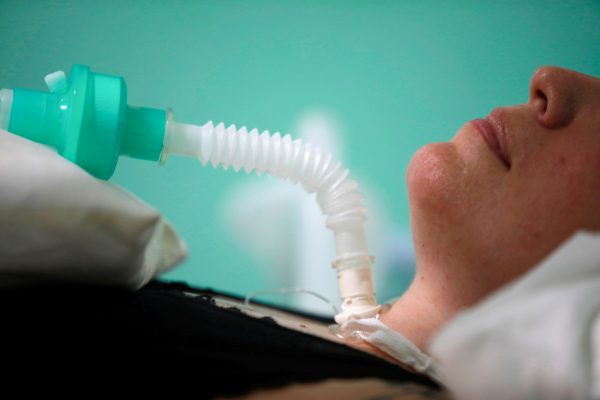Bioethics center offering advice for families struggling with life issues

A euthanasia advocate who suffers from an incurable condition that atrophies her muscles and has left her breathing through a ventilator, lies in bed at her home in Lima, Peru, Feb. 7, 2020. New Zealand bishops have developed guidelines for health professionals, chaplains and priests to assist them in their pastoral work with people who decide to die under the country’s End of Life Choice Act that takes effect Nov. 7, 2021. (CNS photo/Sebastian Castaneda, Reuters)
Families struggle with life and death situations today more than ever. The ethical predicaments have become more complicated as the ability of medicine to keep patients alive has advanced.
John A. Di Camillo, the Personal Consultations director and Ethicist at The National Catholic Bioethics Center in Philadelphia, is offering free advice based on Catholic teaching to individuals and families struggling with complicated issues.
Free consultation service
“We, for many decades, have offered a free consultation service for individuals to be able to call us and ask how to think through the church’s teachings and apply and understand the church’s teachings with regard to health care decisions that they may need to make for their loved ones,” he told the Catholic Advance late last month.
Common inquiries involve hospice and palliative care, questions about the proportionality of ventilators, or nutrition and hydration questions.
“A lot of these are very challenging and sometimes gut-wrenching questions where we want to apply the church’s teachings but we don’t always know or understand what those teachings are and how they quite fit into the specific circumstances that we’re faced with,” Di Camillo said.
The National Catholic Bioethics Center, founded in 1972, has conducted thousands of consultations with its Ph.D.-holding ethicists every year and has recently launched the Personal Consultations Department, consecrated to the Sacred Heart of Jesus, to increase the NCBC’s outreach and to make it more widely available. Di Camillo will coordinate, monitor, and provide follow-up to inquiries. The center hopes to train fellows and interns who can help the staff, respond to questions, and organize the center’s resources for better access.
Decision becoming more complex
“As the ability of medicine increases, the complexity of the decisions, or the benefits and risks of various treatment options change. Something that maybe 10 or 15 years ago was impossible is now a possibility,” he said.
“It’s also important to consider, apart from just the medical side of risks and benefits – and one of the things we often point out in our consultations – you have to consider the individual’s situation: things like their tolerance for pain, their own spiritual values, their psychological and emotional situation.”
Di Camillo, who has a Ph.D. and a licentiate in bioethics from the Pontifical Athenaeum Regina Apostolorum in Rome, said the factors are part of what the Catholic Church understands to be a proportionality assessment. “It’s circumstance specific and tied to the individual’s unique clinical picture.”
Most inquiries involve end-of-life situations such as the proportionality of treatment, nutrition and hydration, hospice care, and advance directives.
Use of contraception
“Another area, I would say it’s actually a bit more specific, is with regard to contraception and potentially therapeutic uses of contraception, or situations in which it may not may or may not be legitimate,” he said.
“A lot of those situations can end up being cases where it’s legitimate, actually, because it’s something like the removal of the uterus, a hysterectomy in certain situations from a gynecological standpoint. These can easily become clearly legitimate therapeutic interventions, though they might also result in sterility.”
Di Camillo said one of the Personal Consultations department’s new goals is to reach as many people as possible.
“Do not hesitate to call us to contact us with any questions or concerns they have about how to navigate these gray areas of the church’s teachings on bioethics and health care,” he said. “We want to also increase our personal engagement, following up with people and making sure that nobody’s falling through the cracks.”
